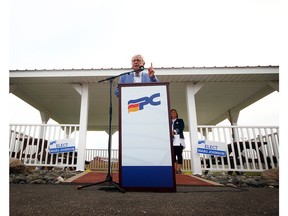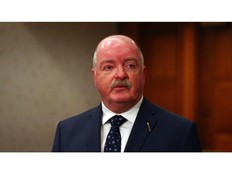Budget: What options Higgs has to fight the cost of living crisis
Another one-time cheque, housing help, an income tax cut, power rate rebate are all options

Article content
The Higgs government is poised to go six for six.
Six straight years in government registering a budget surplus, the last couple so big they broke records.
But bragging about an economic record amid a cost-of-living crisis that’s impacting nearly every New Brunswicker has its limits.
That sets up a new election-year budget where economists say the Higgs government has created itself some fiscal room.
The debate is now over what to do with it.
How much room?
The province is predicting a $247-million surplus by the end of the current fiscal year, now just days away. It comes after a record $1.013-billion surplus last year, eclipsing the $769-million record surplus the year prior, and a $400-million windfall in 2021.
All that has dramatically reduced the province’s debt from a high of $14.4 billion in 2019 to roughly $12 billion currently.
The cost of servicing the debt last year was $584 million, the price tag of interest payments on borrowed money already spent.
But it was a figure that was $683 million the year Higgs became premier.
It means the government has achieved roughly $100 million in additional fiscal capacity by paying down debt – even if higher interest rates eat into this new spending room.
“The track record of surpluses is quite good,” said Michael Yake, an associate managing director at credit rating agency Moody’s, in an interview. “We have provinces that have deficits and consecutive deficits over the same period.
“New Brunswick is the only AA2 (credit rating) with a positive outlook, so it’s performing the best among the broad majority of Canadian provinces.”
Yake said the province is on the verge of a credit rating upgrade due to its recent fiscal management.
“A positive outlook suggests there’s a greater chance there could be an upgrade in the near future,” Yake said.
“We don’t dictate what the interest rates are, but in theory the higher credit rating would indicate to those lending to the province that there’s less risk, and generally if there’s less risk when you lend money then you will offer a lower interest rate.
“As the rate improves, the borrowing costs are better for the government, so they would save money on interest expenses.”
Another one-time cheque?
In his final state of the province speech before this year’s election, Premier Blaine Higgs pointed to how his government’s repeated budget surpluses have lowered interest payments on the province’s accumulated debt.
Higgs said the fiscal room allowed him to announce a new round of one-time payments, citing the newfound fiscal capacity.
The $300 cheques for working families was the second such one-time announcement in three months.
In November, the province announced that low-income seniors who already receive a $400 benefit would get an additional $200, an increase that will be made permanent in this year’s budget.
Could yet another one-time cheque come?
Pierre-Marcel Desjardins, an economics professor at l’Université de Moncton, said he isn’t opposed to targeted one-time aid as it does nothing to structurally tie the hands of the government in the years ahead.
Both Yake and Desjardins warn of incoming economic headwinds that could impact the level of revenue the provincial government has enjoyed over the last few years.
Housing help
Meanwhile, Desjardins says the Higgs government can get the greatest bang for its buck by addressing the rising cost of rent and property values.
“The component of cost-of-living that worries me the most is affordable housing,” he said.
“A lot of people are hurting, it’s costing more and more for housing, and they’ve got less to spend on the rest.
“For folks, especially those on fixed income, seniors, it is a challenge, but it’s also a barrier to economic growth as we’ve got labour shortages and it’s becoming a challenge to bring folks from outside.”
Desjardins said a rent freeze is only a short-term measure that doesn’t address the problem.
“We need to increase the supply of housing,” he said, suggesting a package of measures that includes lowering the taxes on building construction, and incentivizes non-profits and cooperatives to build.
“This is a Marshall Plan that we’ve got to put in place.”
Desjardins said that while the results won’t be immediate, the provincial government can point to a goal of stabilizing rental costs and providing affordable housing for people who need it the most.
That’s while preventing housing prices, and in turn property taxes, from spiraling, and providing opportunities for new generations to be home owners.
“And not only in urban regions, it’s also a problem in rural parts of the province,” he said.
“By increasing supply, you’re going to put downward pressure on prices and that’s going to help people and the economy.”
An income tax cut
Meanwhile, Desjardins discouraged any further promise of an income tax cut.
“Even though we’ve had huge surpluses, we’ve got to be careful,” he said.
“We know health-care pressures are going to increase, we know that there are a lot of things to invest in, and when you decrease income taxes, well that’s the revenue you use to pay for services.
That was echoed by Herb Emery, the Vaughan Chair in economics at the University of New Brunswick, and economist Richard Saillant.
Saillant states that the Higgs government can count on an extra $300 million in additional federal transfers to the province in the fiscal year ahead that’s already been announced by Ottawa. He adds that own source revenue growth typically moves in step with economic growth, pegged at roughly three per cent, for an extra $225 million in the year ahead.
But that half a billion in extra revenue is quickly dwarfed by the pressures from a booming population, rising prices and a health-care system in crisis. Saillant notes that those same pressures have the government on track to grow its spending by more than $1 billion in the current fiscal year.
Emery adds that the province can’t bank on continued jumps in federal transfers in the years ahead.
Meanwhile, more broad-based tax cuts aren’t likely to be as effective as addressing affordability challenges for those facing the largest hardship.
That said, the Higgs government has made it no secret that another income tax cut is on its radar.
Roughly a year and a half ago, the government announced that it would be collecting $70 million less in revenue so it could pass along income tax cuts for New Brunswickers earning more than $45,000 annually.
The Higgs government estimated that it meant an average savings of $310 per New Brunswicker.
At that time, Finance Minister Ernie Steeves also acknowledged that the cut benefited higher earners as the more you make, the more taxes you pay.
Other options
Economists were divided over other actions.
“New Brunswick households are the second most reliant on electricity in the country among the 10 provinces and we spend a considerably larger share of our household income on energy than most other provinces,” said David Campbell, president of Jupia Consultants Inc. and the New Brunswick government’s former chief economist.
“I have no idea, but if I was in the election winning business I might do something on that front.”
The New Brunswick Liberals have pushed a proposal to eliminate the provincial portion of the HST on residential electricity bills, but it’s a plan that would ultimately be more beneficial for larger homes that use more electricity.
Emery warned against the government making changes to the rates themselves as NB Power grapples with its own massive debt and looming new expenses, although he said the province could help ratepayers with bills through the tax system as an offset.
“But that would be precedent setting,” he said. “If there were to be other energy cost spikes in the future you would have to do something.”
Emery suggested there actually may be little new in the budget, and that any new promises may not be rolled out until after the election.
He also pointed to how recent budgets in Quebec and Alberta forecasted the cost of soon-to-be-signed collective agreements that include wage increases as unions push for cost of living increases.
Emery noted Higgs has largely avoided that to date, and has legislated a few remaining unions into a shared-risk pension system against their will.
“I don’t know if he has much bandwidth left to be tough on labour negotiations,” Emery said.
“You now have to be budgeting for that on an ongoing basis.”












Postmedia is committed to maintaining a lively but civil forum for discussion. Please keep comments relevant and respectful. Comments may take up to an hour to appear on the site. You will receive an email if there is a reply to your comment, an update to a thread you follow or if a user you follow comments. Visit our Community Guidelines for more information.